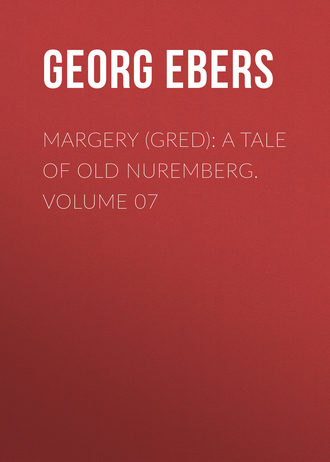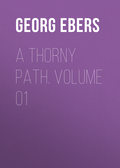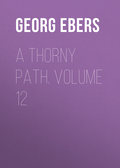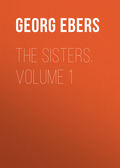
Georg Ebers
Margery (Gred): A Tale Of Old Nuremberg. Volume 07
CHAPTER XIII
Next morning Cousin Maud let me see in a right pleasant way how truly she was in earnest in the matter of thrift henceforth; she would take but one small pat of butter from the country wench who brought it, she sent away the butcher's man and would have no flesh meat, and at breakfast she abstained from butter on her bread, as she was wont to eat it. Likewise the chain and the great gold pin which she ever wore from morning till night, flashing on her bosom like a watchman's lantern, were now laid aside, and while I was eating my porridge she showed me the coffer wherein she had bestowed all she possessed of rings, pins, and the like, which she would presently take to the weigh-house to be weighed and then to a goldsmith to be valued. Howbeit, when I was fain to do likewise with my jewels she would not have it so, inasmuch as youth, quoth she, needed such bravery, and first we must learn how great a portion of the ransom my grand-uncle would take upon himself to pay.
Hereupon, in fulfilment of my purpose yestereve, I made it my hard duty to carry the evil tidings to the old baron, and humbly to remind him of his promise to take care for Herdegen's ransom. It was raining heavily, and a wet west wind whistled along the miry streets. It was weariful to wade through them, and when at last I reached the Im Hoff house Master Ulsenius called to me down the stairs: "Silence, Mistress Margery; there is worse weather in here than without doors!"
Thus as I went into the overheated chamber, I saw there was no good to be hoped for: yet were matters worse than I had looked to find them. So soon as my grand-uncle set eyes on me he frowned darkly, his hollow eyes had an angry glare and, without answering my good-day, he croaked at me: "You hoped that the old man might have passed away into eternity or ever you set forth on your wild adventure? Hah, hah But you are mistaken. I shall yet be granted time enough to show you whom you have to deal with, as it has likewise been enough to show me what you truly are! Whereas I trusted to have found a faithful and wise brain, what have I seen? Loveless and malignant privity, miserable folly, and such schemes as might have been dreamed of in a mad-house!"
"But, uncle, only hearken," I tried to say, and forthwith the idea fell into my mind, which I afterwards found to be a true one, that either Henneleinlein, had yestereve betrayed to him or to her gossip his housekeeper, all she had heard at the Forest Lodge. He would not suffer me to speak to the end, but went on to chide and complain, and broke in again and again, even when at last I found words and made it plain to him that we had kept our purpose privy from him to no end but to save him from grieving so long as we might; and albeit he might be wroth with us, yet he must grant that heretofore we had ever been modest and seemly maidens; but now, when it was a matter of life and freedom for those who were nearest and dearest to our hearts….
Here he broke in with scornful laughter, and cried out that he, for his part, might not indeed hope to be numbered among those chosen few. He had ever known full well that when we did him any Samaritan service it had been to no end save to draw from his purse the money to ransom my brothers and Ann's lover. Every kind word had been pure lies and falseness; yea, and worse than either of us were that crafty witch out in the forest, and the old scarecrow who made boast of having been as a mother to me. Thus far had I suffered his railing in patience, but now it was too much for the hot blood of the Schoppers; I could refrain myself no longer, and broke out in great wrath and reproaches for so vile an accusation. If it were not that his age and infirmities claimed our compassion, I would, said I, after such evil treatment, desire of Ann that she should never more cross the threshold of a man who could so cruelly defame us, and those two good women to whom we owed so much.
I spoke right loudly, beside myself with rage, and my face aglow; nor was it till I marked that my uncle was staring at me as at some marvel that I recovered myself, and on a sudden held my peace, inasmuch as the thought flashed through my brain that I was denying my brother even as Peter denied the Lord, albeit not indeed through any fear of man, but by giving way to my angered pride. Howbeit I had not long ceased when the stern old man cried out in pitiful entreaty.
"Nay, Margery, in the name of the Saints I pray you! You will not make Ann my foe. How hardhearted you can be, and how wroth, and against an old man sick unto death on the edge of the grave!—what was it, in truth, that brought the bitter words to my tongue, but my care and fears for you, who are verily and indeed my only comfort and all I have to love on earth? And now when I say again: I will not suffer you to depart. I will sacrifice all, everything to keep you from running into certain death, will you even then threaten to leave me alone in my misery, and to beguile Ann to desert me likewise?"
Hereupon I spoke him fair and as lovingly as in truth I might, and pledged my word that Ann should not set foot without the city gates or ever my lord Cardinal had come into them, and had given him the comfort of his blessing. And then he was of better cheer, and of his own free will he minded me of his promise to pay certain moneys for Herdegen's ransom; and all this he spoke full lovingly and my heart overflowed with true and fervent thankfulness, so that I took his thin hand and kissed it. Howbeit, he knew not yet how great a sum was needed: and whereas I was about to prepare his mind for the worst, Ann came into the chamber, and as soon as my grand-uncle saw her he cried out in glad good cheer: "Thank God, sweet maid, all is peace between us again. You forego your mad purpose, and I—I will pay the ransom." At this Ann flew to his side and thanked him, with overflowing eyes, and little by little we led him on, till he cried out: "Well, well, children, they surely cannot set the price of a kingdom on that young scapegrace Schopper's head!"
So Ann took courage, and told him that Ursula had, of her deep malice, declared that Herdegen was one of the richest youths of Germany, and that by reason of this the Sultan had demanded the great price of twenty-four thousand sequins.
The truth was out; I marvelled to mark that my grand-uncle was not dismayed as I had looked to see him; nay, but he laughed aloud and said: "That would indeed be somewhat new and strange! You children would ever rack your brains over the Italian poets rather than over matters of mine and thine, albeit that is the axis on which the world turns. There would, in truth, be no justice in so vast a sum, but that in the markets of Egypt they reckon in Venice sequins with none but the Franks; nigh upon thirteen of their dirhems go to the gold sequin, and thus we have- let me reckon—the old trader has not forgotten his skill on his sick- bed—we have one thousand eight hundred and forty and six sequins; and that is a vast ransom still such as is never paid but for lords of the highest degree. Four and twenty thousand sequins!" And again he laughed aloud. "It is easily spoken, children, but you cannot even guess what it would mean. Believe me when I tell you that many a well-to-do merchant in Nuremberg, who is at the head of a fine trade, would be at his wits' end if he were desired to pay down half of your four and twenty thousand sequins in hard coin!"
Then I took up my parable and told him how Eppelein had stamped the sum on his mind, and that he for certain was in the right, both as to the sum and as to the Venice sequins, forasmuch as that Herdegen, to the end that he might know it rightly, had told him that they should be ducats such as he had three in a red stuff wrapper, and Kunz and I likewise each two, in our money-boxes as christening-gifts.
Now while I thus spoke the old man was sorely troubled, and his wax-white face turned paler at each word. He raised himself up, leaning on the arms of the great chair, so high that we were filled with amazement, and he gazed about him with his glassy eyes and then said, still holding himself up: "That, that…. And yesterday, only yesterday…. The captive himself…. Four and twenty thousand sequins, do you say?…. and I—oh, what were my words?…. But what old Im Hoff promises that he will do…. And yet…. If you maids had but been duteous children, if you had but come to me first, as trustful daughters…. Only yesterday I might—Yes, perchance I might…." And then he stormed forth: "But who is there indeed to care for me? Who ever comes nigh me with true love and honest trustfulness? Not one, no, not one!…. Ursula—the lad whom from an infant—and you—both of you, what have you done?…. Yesterday, only yesterday!…. But to-day …. Four and twenty thousand sequins!" His arms on a sudden failed him, and he sank back in a deep swoon, his colorless face drooping on his shoulder. Now, while we did all in our power to revive him, and while one serving-man ran for the leech and another for the friar, meseemed that the old man's left side was strangely stiff and numb; yet the low flame of his feeble life was still burning.
Howbeit, when Master Ulsenius had let blood the old man opened his right eye; and when presently he was able to say: "Book," and then again "Book," we perceived by sundry signs that what he craved was water, and that he spoke one word for another. And thus it was till his chief confessor, Master Leonard Derrer, the reverend Prior of the Dominicans, came in with the sacristan, to administer to him extreme unction. But now, when the reverend Father came toward the dying man with the Body of the Lord, there was so dreadful and sorrowful a sight to be seen as I may never forget to my latter day. Instead of receiving that Holy Sacrament in all thankful humility, my grand-uncle thrust away my lord Prior—a whitebearded old man, of a venerable and commanding presence—with great fury and ungoverned rage, storming at him in strangely-mingled words, which for sure, he meant for others, but in a voice and with a mien which plainly showed that he would have nought of that Messenger of Grace. And from time to time he turned that eye he could use on Ann, and albeit he spoke one word for another, he made shift many times to repeat the Cardinal's name with impatient bidding, so that it was not hard to understand his meaning and his intent to receive the Viaticum from none other than that high prelate.
Howbeit, to us it seemed nothing less than treason to the dying man to interpret this to my lord Prior, in especial since my grand-uncle had, but now, shown us so much favor. Indeed we were moved to show him all loving kindness. Ann held his hand in hers, and whispered to him again and again that he should take patience, and that his Eminence was already on his way and would ere long be here. The reverend Prior showed indeed true Christian forbearance, thinking that the departing soul was more sorely troubled than was in truth the fact. He heeded not the old man's threats and struggles, but stood in silence at his post, and when presently the old Baron's hand dropped lifeless from Ann's grasp he sent us from the chamber.
We could hear through the door the good priest's voice in prayer and benediction, pronouncing absolution over the dying man, and at times my grand uncle's wrathful tones, feeble indeed, but terrible to hear. Each time he broke in on the Prior's pious words we shuddered, and when at last the priest rang his little bell a great terror fell upon us, whereas this ordinance is wont to bring comfort and edification to the soul.
We had been on our knees some long space, praying fervently for that hapless, imperilled soul, when the door was opened, and my lord Prior declared in a loud voice that the noble Baron and Knight Sebald Im Hoff had made a good end after receiving the most holy Sacrament.
Then thought I, a good end peradventure, by the grace of Christ and the Virgin, but a peaceful end alas! by no means. And this might be seen even in the dead man's face. In later years, whensoever it has been my lot to gaze on the face of the dead, I have ever perceived that death hath lent them an aspect of peaceful calm so that the saying of common folk, that the Angel of Death hath kissed them is right fitting; but my grand-uncle's face was as that of a man whose dignity is broken by a mightier than he, and who hath suffered it in silent, gloomy rebellion.
With all our might and soul we prayed for him again and again; howbeit, as must ever befall, other cares came crowding in, to swallow up that one. As soon as the tidings of the old noble's death were rumored abroad, those who had known him in life came pouring in, and messengers from the town-council, notaries with sealing-wax and seals, priests for the burying, neighbors, and other good folk, and among them many friars and nuns. Lastly came Doctor Holzschuher of the council, my grand- uncle's notary, and one of our own father's most trusted friends, in all points a man of such worth and honesty that no words befit him so well as the Cardinal's saying: that he reminded him of an oak of the German forests.
When, now, this man, who in his youth had been one of the goodliest in all Nuremberg, and who was still of noble aspect with his long silver- grey hair lying on his shoulders—when he now greeted us maids well-nigh gloomily, and with no friendly beck or nod, we knew forthwith that he must have great and well-founded fears for our concerns. Yea, and so it was. Presently, when he had held grave discourse with the High Treasurer and the other chief men of the council, he called to him Cousin Maud and me, and told us that old Im Hoff's latest dealing was such, to all seeming, as to take from us all hope that our inheritance from him should help us to pay the ransom for Herdegen. And on the morrow his will would be opened and read and we should learn thereby in what way that old man had cared for those who were nearest and dearest to him.
Hereupon we had no choice but to bury many a fair hope in the grave; and notwithstanding this, we might owe no grudge to the departed; for albeit he had cared first and chiefly for the salvation of his own sinful soul, he nevertheless had taken thought to provide for my brothers and likewise for Ann and to keep the pledge he had given. Never in all his days—and this was confessed even by his enemies, of whom he had many—had he broken his word, and it was plain to be seen from all his instructions that the true cause of the deadly blow which had killed him was the sudden certainty that, by his own act, he had bereft himself of the power to redeem Herdegen by paying the ransom as he had promised.
And this was my uncle's will:
When he had heard from Ann that my lord Cardinal was minded to hasten his home-coming and give him extreme unction, and had likewise had tidings that that high Prelate took great joy in his liberty of dealing with the Papal treasury for alms, he had bidden to him, that very evening, Doctor Holzschuher, his notary, and certain sworn witnesses, and had in all due form cancelled his former will, and in a fine new one had devised his estate as follows:
Ursula Tetzel was to have the five thousand gulden which he had promised her when he had unwittingly killed young Tetzel.
To Kunz he bequeathed the great trade both in Nuremberg and Venice, with all that pertained thereto and certain moneys in capital for carrying it on; likewise his fine dwelling-house, inasmuch as Herdegen would have our house for his own. And Kunz should be held bound to carry on the said trade in the same wise as my grand-uncle had done in his life-time, and pay out of it two-third parts of the profits to Herdegen and Ann; and that these two should wed was the dearest wish of his old age. Not a farthing was to be taken from the moneyed capital for twenty years to come, and this was expressly recorded; nor might the trade be sold, or cease to be carried on. If Kunz should die within that space, then he charged the head clerk of the house to conduct the business under the same pledge. And if and when Kunz should wed, then should he pay only half the profits to his brother instead of two-thirds.
The eldest son of Herdegen and Ann was to fall next heir to the business; but if this marriage came to nought, or they had no male issue, then Herdegen's son-in-law, or my son, or Kunz's.
Likewise he believed that he had made good provision for the maintenance of the young pair, inasmuch as though it could scarce be hoped that Herdegen would be able to take the lead of the trading house, yet his own fortune was not so great as to assure to Ann a life so free from burthens, and in all ways so easy as he desired for her, and as beseemed the mistress of so ancient a Nuremberg family.
His landed estates he had for the most part devised to the holy Church, and the remainder in equal halves to Herdegen and to me.
Three thousand gulden, which he had lent to the Convent of Vierzehnheiligen, and of which he might at any time require the repayment, he had set apart to ransom Herdegen and pay for his home- coming.
Of his possessions in hard coin, three thousand gulden were for Herdegen's share, and one thousand each for Ann and me as a bride-gift, and he had devised goodly sums of money to the hospitals and poor of the city, and the serving-folk and retainers of the household.
But then where was the great and well-nigh royal treasure of which old Im Hoff had, not so long since, been possessed; so that in the time of the Diet he had paid down in hard coin thirty thousand Hungarian ducats to buy himself a Baron's title? Master Holzschuher could tell us well enough. When that old man had once said to Ann that she could scarce believe how great profit might be gained in a few years by well-directed trading with Venice, he spoke not without book. After endowing many churches and convents in Franconia while he was yet living, with truly lordly generosity, and providing for masses for his soul and other pious offices, he had still a sum of forty and four thousand Hungarian ducats to dispose of. And these moneys, notwithstanding Master Holzschuher's entreaties that he would devise at least half of these vast possessions to his own town and near of kin, he had bequeathed to the alms-coffers of his Holiness the Pope, to be dealt with at the pleasure of his Eminence Cardinal Bernliardi, with this sole condition: that every year, on his name-day, mass should be said by some high Prelate for his miserable soul, which sorely needed such grace. Moreover he had provided that the document, duly attested by the notary and witnesses, should be sent to Rome on the morrow by a specially appointed messenger; thus it was long since far away and out of reach when my grand-uncle had learnt that all his remaining possessions were not enough to release Herdegen. And this, as I have already said, had fallen heavy on his soul.
Verily there hath been no lack of fervent prayers for his soul on our part; and at a later time, when I came to know to how many hapless wretches his testament had brought a blessing, little by little I forgave this strange bestowal of his wealth, and could pronounce over his grave a clear "Requiescat in pace!" May he rest in peace!
When we had presently duly weighed and reckoned with Master Holzschuher what we had indeed inherited from our rich kinsman, and how much we might ere long hope to collect of our own and from Cousin Maud, we had it before our eyes in plain writing that a large portion of the ransom was yet lacking. The trade of the Im Hoffs' was to be sure of great money value; but by my grand-uncle's will we might not touch it for twenty years. Likewise Master Holzschuher pointed out to us by many an example how wrong it would be, and in especial at this very time, to sell landed estate at any price, that is to say at about one-third of its real worth. And finally he told us that the Chancery guardians were not at that present time suffered to pay down one farthing of our inheritance from our father. Thus we were heavy at heart, while Doctor Holzschuher was discoursing in a low voice with Uncle Christian and Master Pernhart, and noting certain matters on paper.







